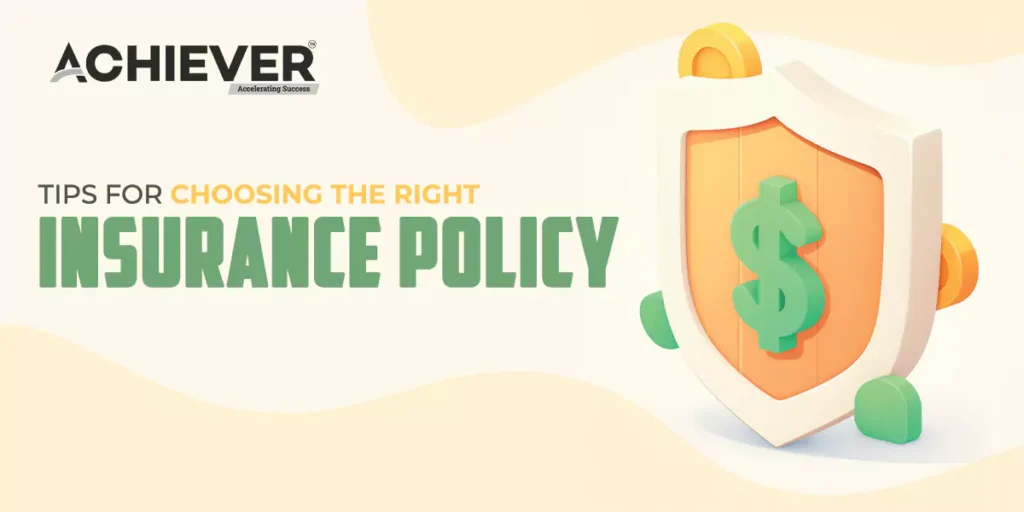Choosing the right insurance policy can feel overwhelming, especially with the variety of options available in the market. However, understanding a few key factors can help you make an informed decision that best fits your needs and circumstances. Here are some essential tips to guide you through the process of selecting the right insurance policy:
- Assess Your Needs
The first step in choosing the right policy is to assess your specific needs. Whether it’s health, life, auto, home, or any other type of insurance, you need to consider what coverage is essential for your situation. For example:
- Health Insurance: Do you need comprehensive coverage that includes regular doctor visits and prescriptions, or just emergency care?
- Life Insurance: Are you looking for term life insurance (which covers you for a set period) or whole life insurance (which lasts your entire life and includes an investment component)?
Understanding your risks and what you want to protect will narrow down the options and help you focus on policies that meet those needs.
- Compare Policies
Once you know what kind of insurance you need, take the time to compare multiple policies. Look at factors like:
- Coverage: What is covered and what is excluded? Make sure the policy covers all potential risks that matter to you.
- Premiums: The amount you pay for the insurance. Don’t automatically go for the cheapest option; balance affordability with coverage.
- Deductibles: How much you pay out of pocket before your insurance kicks in. Higher deductibles usually mean lower premiums, but be sure you can afford the deductible in case of an emergency.
- Limits: The maximum amount the insurance company will pay. Ensure the limits are high enough to cover any significant losses.
- Understand the Terms and Conditions
Before you commit to a policy, thoroughly read the terms and conditions. Pay attention to exclusions, waiting periods, renewal terms, and any other fine print that could affect your coverage. If anything is unclear, don’t hesitate to ask your insurance provider for clarification.
- Check the Insurance Company’s Reputation
Choosing a reputable insurance company is just as important as selecting the right policy. Look for companies with strong financial stability and good customer service records. You can check financial ratings from independent agencies like A.M. Best or Moody’s, and read customer reviews online to see how they handle claims and customer issues.
- Tailor Your Policy
Some insurance providers allow you to customize your policy with additional riders or coverage options to meet your unique needs. For instance:
– Health Insurance Riders: Add maternity benefits or critical illness cover.
– Auto Insurance Riders: Include roadside assistance or rental car coverage.
Tailoring your policy ensures that it offers the protection you need without paying for unnecessary features.
- Consider Bundling Policies
Many insurance companies offer discounts if you bundle multiple policies, such as home and auto insurance. This can lead to significant savings while keeping your coverage under one provider for convenience.
- Review Policy Renewals and Adjustments
Your insurance needs may change over time. For example, a growing family might need more life insurance, or a reduction in the value of a vehicle might prompt a review of auto coverage. Regularly review your policy to ensure it still meets your needs, and take advantage of any opportunities to adjust or upgrade your coverage.
- Seek Professional Advice
If you’re unsure about what type of insurance you need or how much coverage is appropriate, consult an insurance agent or financial advisor. They can provide personalized advice and help you navigate the complexities of insurance policies.
- Balance Premiums and Coverage
When choosing a policy, it’s important to strike a balance between premiums (the cost of the policy) and coverage. Don’t automatically select the lowest premium option without ensuring the policy provides adequate protection. Often, a slightly higher premium can offer substantially better coverage, especially in terms of claim limits or extra benefits.
- Check for Discounts
Many insurers offer discounts based on factors like a safe driving record (for auto insurance), a healthy lifestyle (for health insurance), or installing security features in your home (for homeowners insurance). Ask your insurer about potential discounts that you may qualify for to reduce your premium without sacrificing coverage.
Conclusion
Choosing the right insurance policy involves understanding your needs, comparing policies, and ensuring you’re comfortable with the insurer’s reputation. By following these tips, you can find a policy that offers the protection you need at a price you can afford. Remember, insurance is about peace of mind, so take the time to find the best fit for your unique situation.







